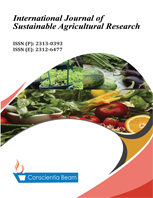Performance of Multi-Purpose Cooperatives in the Shiselweni Region of Swaziland
DOI:
https://doi.org/10.18488/journal.70/2016.3.4/70.4.58.71Abstract
A multi-purpose cooperative is a business that is a mixture of two or more different types of cooperatives. The study examined the performance of multi-purpose cooperatives in Swaziland. The objectives of the study were to; establish the performance of multi-purpose-cooperatives, identify factors influencing the performance of multi-purpose cooperatives, and identify constraints faced by multi-purpose cooperatives. A descriptive research design was used where quantitative and qualitative methods were employed to collect and analyse data. The target population was all registered and active multi-purpose cooperatives in the Shiselweni region. A sample (n=120) was drawn using a two-stage stratified random sampling procedure and it comprised of 80 cooperative members, 35 committee members and 5 cooperative officers who were purposely selected. Face to face personal interviews were used to collect the data. Data were analysed using the Statistical Package for Social Sciences (SPSS version 20). The study found that the performance of multi-purpose cooperatives was influenced by gender and accountability. The study further found that cooperative officers educated and trained cooperative members once a year. Major constraints included poor capital base, most members being too old to perform cooperative activities, and poor record-keeping. The study concluded that cooperatives were not performing well financially, since there were making losses. It is recommended that cooperatives should ensure the financial statements were prepared on time and audited. There is need to encourage young farmers to join multi-purpose cooperative since most of the farmers were old. The frequency of training provided to members need to be improved. The study also recommends that other studies be carried out to cover the whole of Swaziland in order to generalise the findings.

